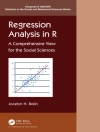‘In their introduction to this Handbook, the editors affirm: ′Many sociologists have come to realise that it makes no sense now to omit religion from the repertoire of social scientific explanations of social life′. I wholeheartedly agree. I also suggest that this wide-ranging set of essays should become a starting-point for such enquiries. Each chapter is clear, comprehensive and well-structured – making the Handbook a real asset for all those engaged in the field.’
– Grace Davie, University of Exeter
‘Serious social scientists who care about making sense of the world can no longer ignore the fact that religious beliefs and practices are an important part of this world… This Handbook is a valuable resource for specialists and amateurs alike. The editors have done an exceptionally fine job of incorporating topics that illuminate the range and diversity of religion and its continuing significance throughout the world.’
– Robert Wuthnow, Princeton University
At a time when religions are increasingly affecting, and affected by, life beyond the narrowly sacred sphere, religion everywhere seems to be caught up in change and conflict. In the midst of this contention and confusion, the sociology of religion provides a rich source of understanding and explanation. This Handbook presents an unprecedentedly comprehensive assessment of the field, both where it has been and where it is headed. Like its many distinguished contributors, its topics and their coverage are truly global in their reach.
The Handbook′s 35 chapters are organized into eight sections: basic theories and debates; methods of studying religion; social forms and experiences of religion; issues of power and control in religious organizations; religion and politics; individual religious behaviour in social context; religion, self-identity and the life-course; and case studies of China, Eastern Europe, Israel, Japan, and Mexico.
Each chapter establishes benchmarks for the state of sociological thinking about religion in the 21st century and provides a rich bibliography for pursuing its subject further. Overall, the Handbook stretches the field conceptually, methodologically, comparatively, and historically. An indispensable source of guidance and insight for both students and scholars.
Choice ′Outstanding Academic Title′ 2009
विषयसूची
PART ONE: THEORIES AND CONCEPTS
The Classical Tradition in Sociology of Religion – Randall Collins
Assessing Modernities – Kevin J. Christiano
From ′Pre-′ to ′Post-′ to ′Ultra-′
Secularisation and Sacralisation Deconstructed and Reconstructed – N. J. Demerath III
Rational Choice and Religious Economies – Frank J. Lechner
Globalization and Localization – Peter Beyer
PART TWO: METHODS OF STUDYING RELIGION
Micro Qualitative Approaches to the Sociology of Religion – James V. Spickard
Phenomenologies, Interviews, Narratives, and Ethnographies
Surveys of Behaviour, Beliefs and Affiliation – David Voas
Micro-quantitative
History, Methodologies and the Study of Religion – John R. Hall
PART THREE: SOCIAL FORMS AND EXPERIENCES OF RELIGION
Congregations Resurgent – N. J. Demerath III & Arthur E Farnsley II
Evangelicalism and Fundamentalism – Paul Freston
The Politics of Global Popular Protestantism
From ′Cults′ to New Religious Movements – Thomas Robbins & Phillip Charles Lucas
Coherence, Definition and Conceptual Framing in the Study of New Religious Movements
New Age Religion and Irreligion – William Sims Bainbridge
Civil Religion in America and in Global Context – Marcela Cristi & Lorne L. Dawson
PART FOUR: ISSUES OF POWER AND CONTROL IN RELIGIOUS ORGANISATIONS
Keepers of the Tradition – Paula Nesbitt
Religious Professionals and their Careers
Orders and Schisms on the Sacred Periphery – Patricia Wittberg
Faith-based Initiatives – Arthur E. Farnsley II
Religion on the Internet – Douglas E. Cowan
PART FIVE: RELIGION AND POLITICS
Religion and the State – N. J. Demerath III
Violence and Human Rights
Religion and Regulation – J A Beckford & J T Richardson
Religion in Rebellion, Resistance and Social Movements – S E Nepstad and R H Williams
Religious Affiliations, Political Preferences, and Ideological Alignments – Laura R. Olson
PART SIX: INDIVIDUAL RELIGIOUS BEHAVIOUR IN SOCIAL CONTEXT
Cross-national Comparisons of Individual Religiosity – Pierre Bréchon
Rethinking the Relationship Between Ethnicity and Religion – Peter Kivisto
Religious Socialization among American Youth – John P. Bartkowski
How Faith Shapes Parents, Children, and Adolescents
Age, Generation and Cohort in American Religion and Spirituality – Michele Dillon
PART SEVEN: RELIGION, SELF-IDENTITY AND THE LIFE-COURSE
Religion and Identity – Arthur L. Greil & Lynn Davidman
Gender Differences in Religious Practice and Significance – Linda Woodhead
Embodiment, Emotion and Religious Experience – Phillip A. Mellor
Religion, Culture and the Charismatic Body
Religion as a Factor in Life and Death Through the Life-course – Stephen J. Hunt
PART EIGHT: CASE STUDIES FROM AROUND THE WORLD
Oligopoly Dynamics – Fenggang Yang
Official Religions in China
The Religious Landscape of Central and Eastern Europe After Communism – Irena Borowik
Judaism in Israel – Stephen Sharot
Public Religion, Neo-traditionalism, Messianism and Ethno-Religious Conflict
State Shinto and Religion in Post-war Japan – Susumu Shimazono
Mexico – Roberto J. Blancarte
A Mirror For the Sociology of Religion












